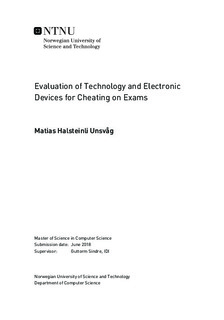Evaluation of Technology and Electronic Devices for Cheating on Exams
Master thesis
Permanent lenke
http://hdl.handle.net/11250/2558739Utgivelsesdato
2018Metadata
Vis full innførselSamlinger
Sammendrag
Currently, most exams on Norwegian universities are paper-based written exams. With the evolvement of technology and its possibilities, university students can transition from old fashion ways of cheating, such as cheat sheets, to using technological devices that are available for purchase online. There are several vendors specializing in selling these types of technological devices, leading to a variety of devices being available. It is uncertain to what extent students and exam invigilators are aware of these types of devices, and there is still little research related to the topic of such devices and their applicability. This motivates for research on the functionality and viability of cheating using different types of technological devices for cheating on academic exams.
The aim of this thesis was to investigate various electronic devices that can be used to cheat on exams. A comprehensive mapping of available vendors and devices was conducted, that can contribute to increasing the knowledge and awareness of exam organizers regarding possible methods for cheating. A selection of the devices were purchased and used in experiments simulating cheating on an exam by using these types of devices. The goal of the experiment was to assess the viability of this type of cheating, the likelihood of being caught, and to evaluate potential countermeasures against this type of cheating.
Through the online mapping it was discovered that there are multiple vendors providing electronic devices meant for cheating on exams. These devices had varying quality and functionality, but the devices tested in the experiments worked well for their purpose, and were small and difficult to detect. The experiments indicate that some devices are particularly useful for exams with multiple choice structure or that require short specific answers, but not necessarily exams that require long textual answers.
The thesis contains several suggestions for potential countermeasures. Although some could successfully be implemented, some of the most efficient countermeasures unfortunately require too much resources, and some leads to students being disturbed or leads to an invasion of privacy.
